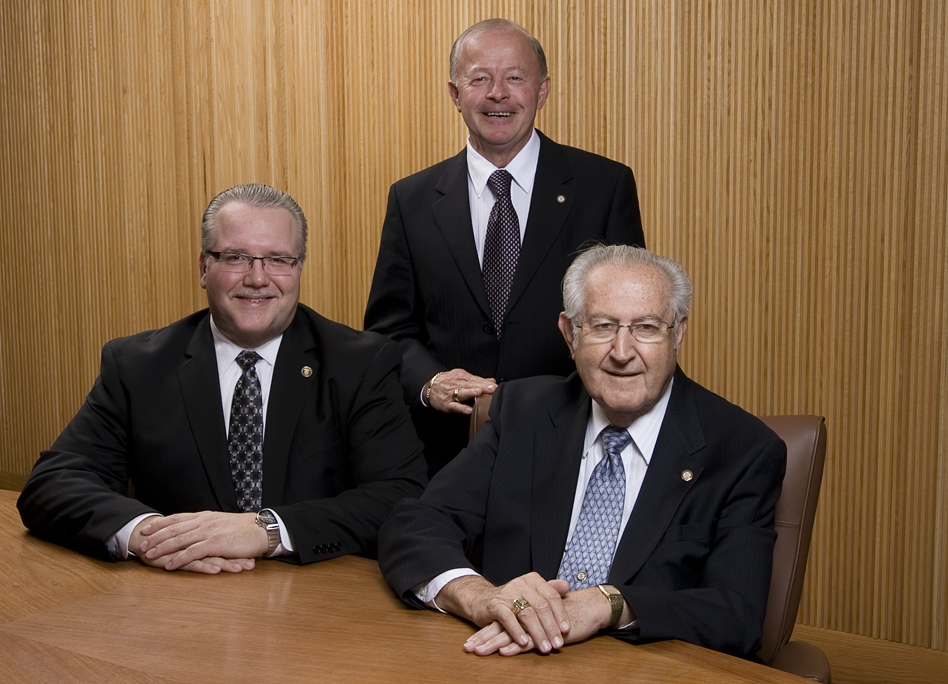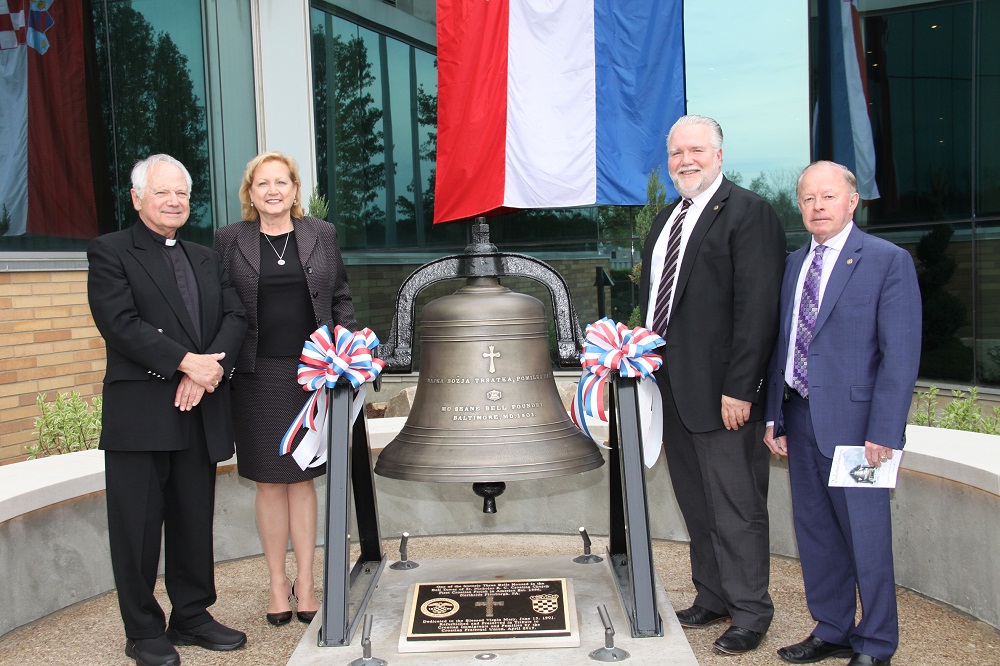On September 22nd, in Pittsburgh PA, the Croatian Fraternal Union of America (CFU) will celebrate its milestone 125th anniversary at the Wyndham Grand Hotel in Pittsburgh. The 25th Quadrennial CFU convention will be held there on September 23-25. Her Excellency, Madam President Kolinda Grabar-Kitarović, is planning to attend the gala banquet on Sunday, September 22nd. This article and the following interview will be about National President Ed Pazo and many notable accomplishments of the CFU within the Croatian American community.
The CFU has played an invaluable role in Croatian American society since its inception in 1894, when it first served to provide death benefits to widows of Croatian coal miners and steelworkers. It has since evolved into an organization that provides insurance, investment products, and financial services to over 65,000 Croatian Americans. However, it’s even more amazing how this Croatian American organization has kept Croatian culture, music, and dance alive and thriving in the USA when Croatian culture was frowned upon in the former Yugoslavia.
The CFU has always held a special place in my heart and family history, as my grandfather, Thomas Rukavina, joined the CFU in Minnesota in 1924. Following in his footsteps, my father, Joseph Rukavina, was also a proud CFU member for 70 years; he was a national delegate at eleven of the last thirteen CFU quadrennial conventions. Moreover, my Croatian relatives from Perušić, Dugo Selo, Špišić Bukovica, and Zagreb, could not believe that my dad—born in the United States—knew over 75 Croatian songs. This Croatian connection was primarily due to his CFU membership, as he channeled his activism within the Croatian cultural and music programs that were offered by the Croatian Fraternal Union. Today, I am fortunate to say that I am a 48-year member of the CFU and will proudly represent our Philadelphia Lodge 760 at this anniversary convention as a national delegate. I am also proud to mention that Ed Pazo and I are the only two Croatian Americans to attend all 25 National Assembly of Delegates meetings for the National Federation of Croatian Americans Cultural Foundation (NFCA).
Since its beginnings almost 125 years ago, the CFU has extended over 1.2 million dollars to sponsor about 1,500 Croatian orphans and has extended an estimated 23 million dollars in goods, services, and assistance during the 1990s to assist Croatians within the Republic of Croatia and within Bosnia and Herzegovina. The CFU scholarship program has awarded thousands and thousands of scholarships to the children of its members. Also, the CFU sports programs and tamburitzan dance festivals are legendary, and have brought so much joy and Croatian fraternal fun and friendships all over North America—for over 400 lodges. As evidenced by history, the CFU is so much more than the insurance and financial services it provides.
On September 23, 2018, Ed Pazo accepted, on behalf of the CFU, the Charter of the Republic of Croatia Award extended by Madam President, Kolinda Grabar-Kitarović, in New York City. This award was the ultimate recognition that our Croatian American fraternal organization has immensely contributed to the promotion of and to the cultural and economic developments of the Republic of Croatia!
I hope you will read this Ed Pazo interview in its entirety to understand where Ed’s commitment comes from, and become better acquainted with the rich history and the workings of the Croatian Fraternal Union of America.
Ed Pazo Interview conducted on May 14th, 2019 by Anna Maria Sičenica, NFCA Rudy Perpich Summer Fellow:
First, could you please share a little bit about your background and personal connection to Croatia?
My family roots are Croatian, as both sides of the family come from Croatia. Specifically, my mother’s father, Josip Ferenčić, and mother, Jela Martinjak, are from Hrvatsko Zagorje, Selos Burenac and Bisag, respectively. On my father’s side, my grandfather, Grgo Pezo, was born in Lokvičići, near Imotski in Dalmatia; while my grandmother, Anka Sokolić, was from Vrlika—also located in Dalmatia. In 1906, my grandfather Grgo came to Clairton, located here in Western Pennsylvania, followed by my other grandfather, Josip, in 1912. Interestingly enough, the family name of “Pazo” was adopted from “Pezo”, a family name that began once my family immigrated to the U.S.
Having grown up with three of my four grandparents alive provided me with plenty of exposure to the Croatian language, customs, and rich history. My grandmother from Vrlika lived in the house right next door to me growing up, and my cousins lived on my street as well—which meant that I was always surrounded by my Croatian family and their stories about the homeland. My grandparents were members of the Croatian Fraternal Union from the time of their immigration to the United States, and this tradition continued along to my late father Edward, mother Catherine, who has been a member of the CFU for all of her ninety-one years, myself, my wife, and my children.
Ed Pazo photo on his first day as the National CFU Secretary Treasurer, on December 1, 1993; to his left, his mother Catherine Pazo, and to his right, his aunt Mary Plevel and with other family relatives in the back row.
How did you first get involved with the CFU, and what lead you to your position today?
Both of my parents were members and officers of our hometown St. George CFU Lodge, in Clairton, PA. My earliest childhood memories of Croatian events centered around our Croatian home in Clairton and the many picnics, meetings, and celebrations that were held there. Upon my father’s death and only entering adulthood myself, I was appointed to my father’s former position on our Lodge Board of Trustees at the age of eighteen.
At the same time as I was pursuing my Bachelor of Science at the University of Pittsburgh, I became the youngest delegate at two quadrennial CFU National Conventions in 1983 and 1987. These conventions eventually lead to my election to the CFU National Board of Trustees in 1991, coincidentally, the same year I graduated with an MBA from the University of Pittsburgh. A few years later in 1993, this position was followed by the appointment of National Secretary/Treasurer at the age of 30, a position I remained in until 2014, at which time I was elected to succeed my colleague and mentor, Bernard M. Luketich, as National President of the CFU. Throughout my life, the CFU has always played a central role; even as I was working on my studies and eventual career at Westinghouse as a project engineer—where I remained for seven years—I always remained engaged and connected to my local Clairton Lodge and the CFU organization.
What do you think is the most special and unique thing about the Croatian Fraternal Union as an organization?
Our society was founded 125 years ago in Pittsburgh by Croatian immigrants who needed an organization that would accept them for who and what they were. The CFU provided a needed social and economic sanctuary to working class people—many new to this melting pot of America. Our first CFU members didn’t speak the language well, and many didn’t have extended families to rely upon for kinship and support. Also, most early Croatian Americans didn’t have savings or life insurance to protect them and their soon-to-be expanding families in the event of financial hardships. Our society filled that void immediately and in a manner that was unique among any other Croatian organizations in existence, both back then and now. The CFU has grown from its meager beginning of twelve U.S. citizens and funds totaling less than $50.00, to a modern day insurance company with nearly $500 million in assets, 50,000 members, and 400 Lodges and Nests across the U.S. and Canada.
Additionally, the CFU has always managed to stay true to its founding tenets of promoting, preserving, and perpetuating Croatian culture and heritage outside of the homeland of Croatia through a wide array of cultural and fraternal programs, which benefit both our members and the Croatian diaspora community at large.

Ed Pazo with CFU officer, Franjo Bertovic and former CFU National President Bernard Luketich
How would you describe your longtime mentor, National President Bernard Luketich?
President Luketich was a legend among men. He walked and talked with Prime Ministers, Presidents, Cardinals, and other high ranking persons. However, he never lost the common touch; he was equally at ease with political dignitaries as he was with CFU members who approached him by his nickname of “Bernie”. He was known for being the guy you’d go to for advice, and someone that would always lend an ear. For example, during the Clinton administration, Bernie visited Vice President Al Gore, and then attended a CFU picnic where he cut and served roasted janjetina, (lamb) for our members. Bernie was also a living representation of Croatian culture and its people due to his vast historical knowledge and stories amassed over the course of a lifetime. This knowledge was instrumental in bringing about positive policies for Croatia and its citizens, as Bernie was able to share his concerns and ideas among his inner circle of American elites to create real and lasting policy changes.
Could you please share a few highlights and details about what is located here at your national headquarters in Monroeville?
While there are many subordinate lodges across America, the CFU headquarters is the only office for the entire organization. Housed in a modern glass building designed by architect Louis D. Astorino, from our headquarters here in Monroeville we conduct business every day. However, the CFU headquarters also serves as a living museum with a collection that houses naïve Croatian artwork, narodne nošnje (Croatian national dresses), and other Croatian artifacts. The collection features artworks from artists such as Ivan Meštrović, Ivan Lacković, Josip Generalić, Josip Cugovčan, and Mladen Veža, among others, and I’m proud to say that we have more naïve art at our home office then anywhere outside of Croatia. The most recent addition to the CFU Home Office is one of the three historic bells which was previously housed in the bell tower of St. Nicholas R.C. Croatian Church, the first Croatian Parish in America. The bell was refurbished and preserved in tribute to Croatian immigrants and families by the Croatian Fraternal Union, and will remain on permanent display at the Home Office. In short, the CFU headquarters is a culture museum, work place, and monument to all of those that came before us; it’s a culmination of our ancestors’ hard work, and represents the spirt and pride of being Croatian.
Could you please share any key details about the upcoming 125th CFU Anniversary this September?
I’m pleased to say that Croatian President Kolinda Grabar-Kitarović will be a main guest at our banquet. The CFU is planning a series of events for our upcoming 125th CFU Anniversary on September 22, including a mass, banquet, and convention that following Monday. The CFU is also pleased to announce that there will be special entertainment from Croatia, as Tamburaški Sastav Ravnica will be concluding their CFU sponsored tour at the CFU weekend anniversary celebration.

Father Phillip Pribonic and the CFU Executive Board, Bernadette Luketich-Sikaras with Ed Pazo and Franjo Bertovic
What are your hopes for the future of the CFU?
The Croatian Fraternal Union has changed with the times and modernized, as it has needed to conduct business to remain a viable financial organization. Yet, the organization has also managed to remain true to its origins by exposing Croatians in North America to Croatian culture and history. My hope for the future is that the CFU can appeal to an ever increasing number of Croatian Americans and Canadians, and that we can continue to expose people to our historical roots and encourage them to join our society. It is important to note that the CFU is the largest and most influential Croatian organization outside of Croatia, for no other society has as many members and has been in existence for so long. For this reason, I am optimistic about the future of the CFU, as families—such as my own son Eddie, and daughter, Alexandra—will continue to carry on traditions, sing, and dance to Croatian music for generations to come.
More news about diaspora can be found in the dedicated section.









